Young engineers making their contribution to change
By ewbexec
With the onset of greater global communication and ease of transportation around the world, the number of humanitarian efforts has grown exponentially in the past few decades. Engineering, healthcare, and science fields have especially been driving contenders in a common goal for global development around the world. The breadth and speed of such international aid has been made a priority by both major government and NGO institutions. For example, the United Nations Development Program, established in 1965 by UN’s General Assembly, is an effort to take a stand on global improvement for all who need it. With affiliations in over 150 countries, they have formed a network of programs to improve people’s quality of life in underdeveloped countries and have established “Millennium Development Goals” in order to track progress. Indeed, there have been a plethora of organizations established to provide humanitarian needs in an effort to improve people’s quotidian lifestyle – i.e: Engineering Without Borders, established in the United States in 2001.
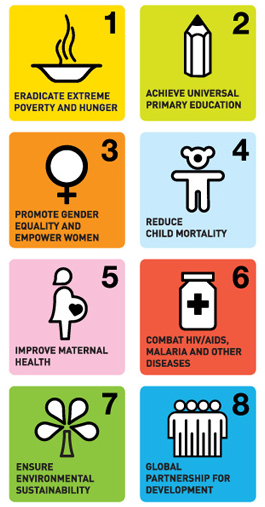 Global development efforts can be approached in a multitude of ways, as they impact every aspect of a community’s social life. It may come in the form of education, foreign monetary aid, poverty reduction efforts, implementation of projects, infrastructure, or ensuring human equality. Currently, the efforts for global change and improvement have had an astounding impact in bringing help to millions of people in impoverished communities. Spearheaded by the UN’s eight Millennium announcement, announced in 2000, are goals that researchers and other humanitarian workers will strive to achieve by 2020. These marked one of the first comprehensive and holistic programs for becoming aware and acting upon the issues around the world.
Global development efforts can be approached in a multitude of ways, as they impact every aspect of a community’s social life. It may come in the form of education, foreign monetary aid, poverty reduction efforts, implementation of projects, infrastructure, or ensuring human equality. Currently, the efforts for global change and improvement have had an astounding impact in bringing help to millions of people in impoverished communities. Spearheaded by the UN’s eight Millennium announcement, announced in 2000, are goals that researchers and other humanitarian workers will strive to achieve by 2020. These marked one of the first comprehensive and holistic programs for becoming aware and acting upon the issues around the world.
The Boston University EWB chapter has assisted in spreading awareness for global change by contributing to the effort for improving communities in developing countries. Our Yagi Cell Signal Amplification project, aimed at expediting the retrieval of blood test results to mothers, and water sanitation project are both part of UN’s eight Millennium goals, as we are working towards making a direct impact within our partner community of Naluja, Zambia. When in great numbers, this local approach to global development can have a significant influence on a region. The spread of knowledge can make communities self-dependent and educated enough to implement sustainable projects in surrounding areas. Also, the personal contact that comes with a local partnership enables close progress of development and confidence that improvements are being made through monitoring efforts.
The culmination of many developmental efforts within a country has the potential to have an even more significant impact on social change. Efforts for global aid, such as infrastructure and implementation of necessary solutions for improved health, form a stage for further progress in the country’s other sectors. In a more holistic view of global development, domestic progress can enable economic security and political stability to take form. These are essential attributes for maintaining a resourceful public sector, while enabling the growth of private business for diversification of the economy and a growing workforce. Furthermore, once infrastructural development has been achieved, the issue of human rights and equality can become a central focus in order to ensure flourishing relations among people. Ideally, with such development, a country will be able to join the globalization of the past few decades in order to contribute and benefit from a more unified and collaborative global effort.
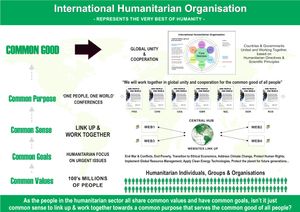
Assessing contributions that have already been made to the common goal for global change makes us realize the incessant need for more change and ethical issue of humanitarian goodness through collaboration. The waves of financial crisis coupled with major natural disasters have had an impact on the rate of development. However, the growing innovations in technology and healthcare have led to the development of simple, sophisticated, and sustainable solutions that can have a significant impact on future development. As stated by One World One People, an initiative to unite efforts for global change, “when humanitarian Individuals, Groups and Organizations link-up and combine their numbers and strengths – they will all succeed!” This embodies the social responsibility each of us must take upon ourselves in order to evolve humanity as a whole and ensure further exponential growth in the developing world.
By ewbexec
During the past few months at Boston University, the streets that were bustling and full of action during the final weeks of the semester were tuned down as the summer atmosphere settled in. However, the pleasing environment is a great time for our organization to get even more work done as we have finalized preparations for our trip to Naluja, Zambia!
Our travel teams and students are very excited for the upcoming trip and have been through weeks of preparation to achieve our goals in Zambia.
What we hope to achieve
The trip will take place August 10th – 27th, giving us much time to spend with our partner community and accomplish goals for the three projects we are currently working on. Our partner community is a small village in a rural region located in the Kalomo District of Zambia’s Southern Province. The population is approximately 15,000 and centered around the community’s only health clinic. This will be our second trip to Naluja, following last summer’s assessment trip and first encounter with the people of the community.
Having progressed on our three projects throughout the year, we anticipate the trip to improve the community’s health conditions and continue our mutual goal for development. Our focus will be implementing the Cell Phone Signal Amplification project, using a double Yagi-Yagi system. We have fine-tuned the model of the project in order to get the best possible boost in cell signal, while ensuring simple construction, minimum maintenance, and sustainability. We also hope this will bring support to CGHD’s (Center for Global Health & Development) and ZCHARD’s (Zambia Center for Applied Health and Research Development) text-messaging system that looks to improve the communication of medical blood-tests that scan for HIV in infants. Expediting the transmission of results from the medical centers in the nearby cities to the remote the village is essential to tend to the health needs of the infants at their most precarious stage of life. Also, amplifying signals will promote greater intra-community communication and greater outreach outside of the village. This trip will also serve as an assessment for our two remaining projects – water filtration and power generation. The assessment phase of these projects is crucial to acquire information from the environment and data from the clinic in order to weigh the feasibility of designs we will start prototyping this coming fall.
Furthermore, another goal of this trip is to strengthen our ties with the community and local partners in order to move forward towards accomplishing more in the next few years. Having a close contact with our partners will help us gain a better understanding of what they need to improve community health and what they would like to improve in their village. We hope to gain more information to think of future projects that will further community development.
Meet our travel team
The travel team that will embark on this exciting journey is composed of two Boston University students and two mentors from the EWB-Boston professionals network. The two students - Nathanael Lee and Dan Sade – make up a well-rounded and motivated group that have the determination and skills needed to take on such an experience. Furthermore, the two mentors – Mohammed Jafri and Hunter Chaconas – will bring their professional expertise in ensuring that implementation and assessments are done properly. We are fortunate to have Mr. Jafri return to our travel team for the second year, as he will oversee both the Cell Signal Amplification and Power Generation projects. Mr. Chaconas, our newest mentor, has been working close with students in the water filtration group as he plans to oversee that aspect of the trip. All students and mentors will work closely and in a collaborative manner to accomplish our goals on this trip.
Nathanael is a rising junior in BME and is a returning member from last year’s travel team. Going for the second time will give him a unique perspective as he will be able to witness the progress between the previous trip and the upcoming one. He has been involved in much of the travel preparations, prototyping of projects, and lead of power-generator project. His experience from the previous trip will bring great insight as the other students make their first encounter with the locals of Naluja.
Dan is a rising senior in ME and has done much work on the Yagi Antenna and mapping of the region in Zambia. Having a keen eye of exploration and adventures, he had the following to say when pondering about the approaching trip: “I am very excited for the trip. I think we have a lot of responsibility representing the chapter, and I look forward to executing our mission in Naluja. I also look forward to meeting new people along the way in Zambia… I'd like to leave Zambia with a better understanding of how Zambians see themselves in today's global age. More precisely, how they view themselves individually on the world stage, what their aspirations are for their nation, and what they think the country should become going forward.”
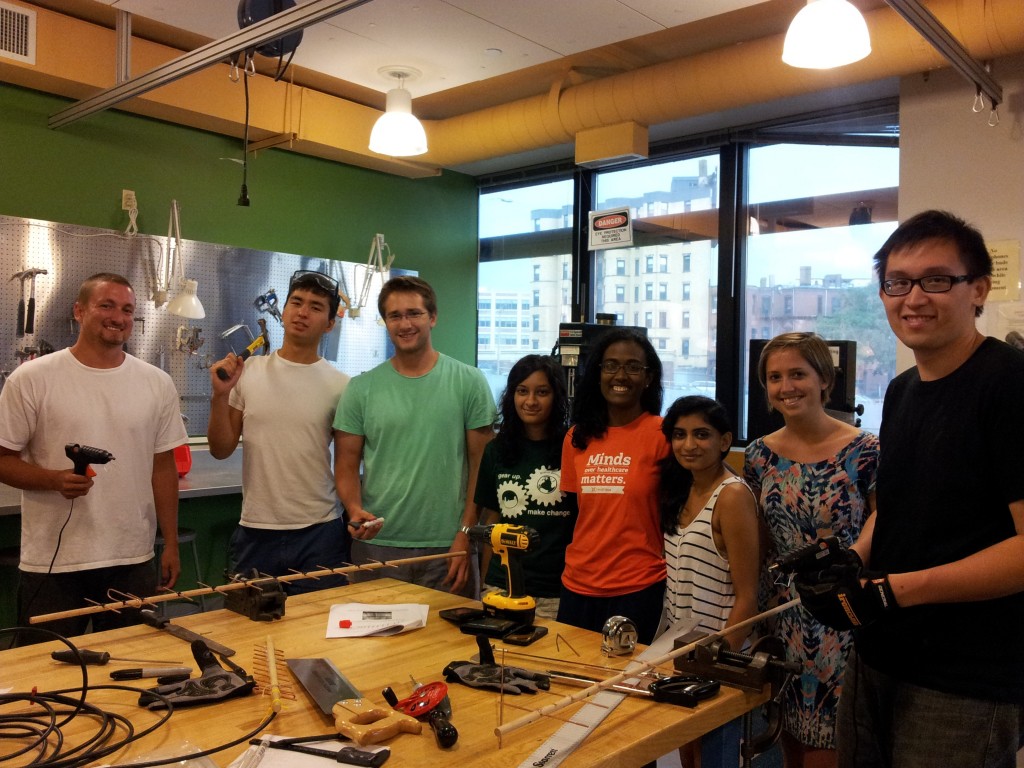
Travel team and other EWB members prototyping our Yagi Antenna!
Preparations: Over the course of the past few months we have been busy preparing for impending lift off to Zambia, a journey that takes over a day to reach our final destination. The summer calm has given us time to coordinate with our local partners, prepare equipment for building, plan logistics, and complete other travel preparations such as renting camping gear from the BU Outdoor Club and filling paperwork for international travel. A few weeks ago, the travel team and other members of our chapter met for a comprehensive tech-day that involved prototyping and presentations of all three of our projects.
Take Off!
The culmination to our trip has been the product of a close collaborative effort between our partners in Zambia, executive team, general members, travelers, mentors, partners in Boston, and Boston University departments – College of Engineering and CGHD. We are fortunate to have the support and opportunity to return to Naluja in order to continue our progress towards improved community health. It brings us much joy and motivation to embark on this journey as we look to accomplish our goals and set new ones for the coming academic year! Best of luck to our travel team!
By ewbexec
To our great delight, we have a long list of devoted students who are continuously involved in our chapter at Boston University. At the beginning of every year, students express much interest in participating in our mission to raise awareness for global development. Furthermore, they are always excited to join our technical groups by helping prototype projects that will help move towards our implementation goals in Zambia. Interestingly, the holistic EWB process is sometimes overlooked when students join our group in the middle of a program, as the one in Naluja.
For our members and partners, we believe that it helps to have an understanding of each step of the process in order to move towards our yearly goals. The article below will outline the major steps involved from the conception (start) to culmination (closure) of a program and describe our current place in the process. We hope that such an overview of the program cycle will help give you a better understanding of the steps that were needed to achieve our present state and our vision as we move towards our goals.
Phase One: Starting a Program
EWB emphasizes a community-driven approach to development, in which the community-in-need must be well structured and have a thorough understanding of their needs. EWB’s review committee grants program approval to a community only after a thorough analysis of its drive for improvement, local partnerships, and community agreement if accepted. After an EWB-chapter applies to adopt a community program, the two partners start a close relationship that will strive for many years after the program’s inauguration. At this point, the EWB-USA chapter has engaged in a commitment that will last a minimum of five years, giving much time for setting and accomplishing precise goals for community development and increased health.
As you may know, our chapter started a partnership with the community in Naluja, Zambia just a few years ago.
Phase Two: Assessment and Prototyping
This phase of the process usually occurs between three months and one year from the time when a partnership has been established and approved between the EWB-chapter and community. This phase includes thorough research of the many different factors related to our community. There is first an investigation of the community’s geological landscape, available resources, cultural adherences, and the people’s most dire community needs. Through much cooperation and communication with community authority and surrounding NGO partners, we establish goals to assess the community’s needs. A comprehensive community assessment is made by a first assessment trip. This is an exciting time to meet, in person, our partners in their local village, while gathering much needed information on which projects we will be researching and propose engineering solutions that will address the community’s problems. It is also for strengthening collaborative ties and partnerships with our partners. During the summer of 2012, our EWB chapter at BU sent three students and a mentor on its first assessment trip, gathering much information to work towards implementing the cell signal amplification project. The assessment phase of a program is also a time during which projects are researched and prototyped until the most sustainable, economically manageable, and efficient project is proposed to the community to resolve one or more of their community issues. Our chapter is currently in this phase of the process for two additional projects in the program in Zambia – water sanitation and power generation.
Phase Three: Implementation
The crossover to this phase of the process is achieved when a final design is proposed and approved for implementation in the community. This can only be done after a thorough analysis of the project’s sustainability, a certitude that the project will be accepted and wanted by the community, and that detailed plans are made for on-site implementation. There is much preparation involved in making sure that any foreseeable obstacles will be addressed and that all measures are taken when the project is installed, in order to ensure its successful use by community members. There are multiple aims to an implementation trip, which our chapter will be conducting this coming August. The first is to successfully implement a project and ensure that it functions properly, fulfilling the community’s need. Another important goal is the dissipation of information by giving community members tutorials on how to build, fix, and monitor devices that are implemented. This also involves the preparation of a project manual and education material that will emphasize the importance of acquiring knowledge about the problems the people face and projects that are implemented. It gives an opportunity for community members to realize the importance of implementing change to improve overall health and teaches them the skills necessary to build more such models of the project for personal use. In conjunction to the implementation trip, our chapter will also gather information as part of an assessment trip for the water and power projects, as mentioned above.
Phase Four: Monitoring and Contemplation
After a project has been successfully implemented in a community, there is a monitoring period of several years during which a close collaboration is maintained with the community in order to ensure that all projects are functioning properly and optimally. Once a project has reached this phase, it can also be a time to implement more projects to improve other aspects of the community’s health. In all cases, the EWB-chapter still continues to monitor all of the projects’ progress. Our chapter is moving fast and on track to reaching this phase for at least one project in the near future. This will certainly be a moment of reflection as we will look back at our hard work and hopefully celebrate improved health with many of our friends in Naluja. We will be able to learn from our experiences, improve our tactics, and look forward to more ways of helping our partners by engaging in the efforts for global development.

This is an overview of the EWB cycle, without getting too entwined with the plethora of paperwork needed at each stage of the process. It brings much joy and hope for global health when our year’s goals are successfully reached in our partner community in Zambia. However, taking a step back enables a more holistic vision of all the accomplishments that have been reached so far and the steps that lie ahead of us in the process.
By ewbexec
As the academic year comes to an end, it is always a time of personal reflection and mixed emotions. The Engineers Without Borders chapter at BU works holistically as a group, combining the efforts of all its members to reach the year’s goals. Indeed, each year the organization is headed by an executive board that guides the body towards actualizing the visions we have. They work consistently with both students and partners to accomplish as much as possible in the span of just two semesters. However, as a new academic year waits, the E-Board transitions to a new group of students that will be indispensible to move towards our long-term goals in Naluja and beyond.
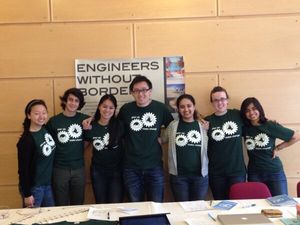 As the current E-board seamlessly transfers its wisdom to the new executive board during the transition phase, we are very thankful for their work this past year. Their efforts and passion for EWB is expressed with much excitement every time they advocate EWB and other global development initiatives. By virtue, they became role models for all members and were a defining part in making the program in Naluja a success thus far. This is also a time to assess what the next goals will be, starting with our first implementation trip this summer, and further objectives that will help reach the same vision – providing sustainable solutions for global development and community health.
As the current E-board seamlessly transfers its wisdom to the new executive board during the transition phase, we are very thankful for their work this past year. Their efforts and passion for EWB is expressed with much excitement every time they advocate EWB and other global development initiatives. By virtue, they became role models for all members and were a defining part in making the program in Naluja a success thus far. This is also a time to assess what the next goals will be, starting with our first implementation trip this summer, and further objectives that will help reach the same vision – providing sustainable solutions for global development and community health.
The E-board for the 2013-2014 academic year will comprise of three returning members: Krutika Hosur (Vice President), Shreya, Deshmukh (Program Chair), and Donovan Guttieres (Secretary). We are proud to welcome the new members of the executive board, and look forward to further accomplishing our vision in the upcoming year. Here is a message they have for the members and partners of EWB-BU:
Alan Pacheco – President
I'm honored to lead EWB-BU and am very excited for the year we have ahead. As our projects begin to get off the ground, we will need the various skills that all group members and partners provide to ensure our goals are met. I believe we are capable of making a concrete difference in Naluja and am greatly looking forward to working with all our members and our new E-Board.
Teresa Fulcher – Social and Networking Chair
Future sustainable technologies and the development of global health systems is in our hands, ALL OF OURS; engineers and non-engineers alike! I wish to join hands with public health workers, BU faculty, and the general student population to show people how they can help us take our next steps. Everyone has something to offer and a few more links in our organization could turn a few ideas into great progress this year.
Kara Le Fort – Fundraising Chair
As a member of the E-board, I am looking forward to finding a more dependable financial source next year. Our project needs a somewhat continuous funding source to truly meet the goals we want to reach. I am also excited about planning the fundraising events on campus not only because they are fun but also because they are great way to get the whole EWB team involved and raise awareness around BU.
Taka Suzuki – Treasurer
I am very excited about this upcoming year, and I will work hard to be a good treasurer! Feel free to talk to me about anything! I am looking forward to meeting new members!
By ewbexec
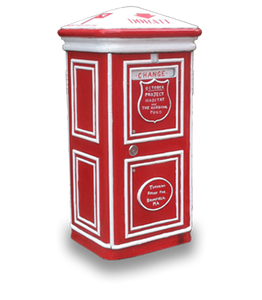
We are very pleased to be Project Mailbox’s partner for the second time since their organization was formed! This is a "charity for other charities", helping raise awareness and funds for other non-profit organizations. We have been selected as Project Mailbox’s March Charity of the Month, which involves an international organization that promotes aid and humanitarian help in other parts of the world. This is an ideal fit for us as we continue to work towards our next trip to Naluja, Zambia in order to implement our first project – the cell phone signal amplification antenna, as well as gather information for future projects. This is a wonderful fundraiser for you to participate in to help us reach our goals of returning to Zambia and to take a part in making global development a success.
The Project Mailbox runs through the entire month of March! So, any change (coins), cash, or other sources of funds that may help us towards our trip will be given directly to EWB-BU to spend on our projects in Zambia. Any such funds are much appreciated and will certainly be used efficiently to help thousands in the Naluja community. We all have change cast off in corners of our rooms, so instead of letting it accumulate dust – bring it to the Mailbox! Actually, any form of funds can be simply dropped off in the mailbox on your way back from class or when going out.

The mailbox has distinct red and white colors placed near Warren Towers, right outside of University Grill at 712 Commonwealth Avenue. Any amount of change can accumulate to make a big impact and enable us all to “make change” in our goal for global health and development.
By ewbexec
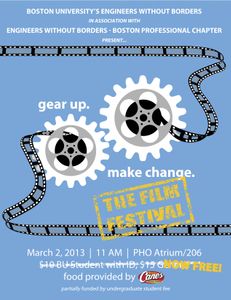
The EWB-BU organization is ready and excited to present the first ever Film Festival! We have compiled a series of short films and feature length movies that will discuss both global development and the humanitarian work we do. As we continue our partnership with the community in Naluja, Zambia this film festival is intended to reach out to more people in order to raise awareness for global health and community development.
- When? March 2, 2013, starting at 11 a.m.
- Where? BU Photonics Center: 8 St. Mary's St. Boston, MA 02215
- How Much? FREE!
- Why? There will be food from Cane’s, great movies to watch, exciting things to learn, and many people to meet!
- Films? We'll have some excellent titles, including "The Shape of Water," RX for Survival: A Global Health Challenge," "AIDS Warrior," and "Kids Living with Slim."
The film festival will be a fun experience that will give you the opportunity to meet other students that are compassionate for helping communities that lack essential resources. We hope to unite all the organizations that are involved in global work and community-oriented efforts. This will establish a common ground platform for making connections, spreading awareness, gaining contacts from professional groups, and meeting motivated students through an entertaining and unique setting.
Guaranteed a great experience and meeting interesting people!
By ewbexec
 Making a profound impact in today’s developing world takes more than just one skill set, but rather the collaboration between groups to achieve success. In his book “The World is Flat”, Thomas Friedman vehemently claims that the world is smooth and the playing field of the world’s different countries has been flattened to a one-dimensional plane. Of course, this is just a metaphor to explain the global mechanism of today’s developing world in the twenty first century. Now are the days of increased competition for resources and knowledge. With that must come interpersonal connections and collaborations for optimal success.
Making a profound impact in today’s developing world takes more than just one skill set, but rather the collaboration between groups to achieve success. In his book “The World is Flat”, Thomas Friedman vehemently claims that the world is smooth and the playing field of the world’s different countries has been flattened to a one-dimensional plane. Of course, this is just a metaphor to explain the global mechanism of today’s developing world in the twenty first century. Now are the days of increased competition for resources and knowledge. With that must come interpersonal connections and collaborations for optimal success.
The nature of Engineers Without Borders maintains a principle of multidisciplinary teamwork. Especially in our chapter at Boston University, we collaborate with a wide range of students, ranging from English majors to health professionals and mechanical engineers. As we look to make an impact on the world, currently focusing our efforts on the community of Naluja in Zambia, we must collaborate. However, the interactions do not stop here. As we move towards our goals of fulfilling humanitarian work, we must build even more “bridges” in this flattened world. Our partners in Naluja have become some of our closest allies in helping us achieve and implement our models for sustainability.
 Moreover, donators and philanthropic sources are another set of people to whom we feel close to and must maintain relationships with. In order to successfully implement our projects, our multidisciplinary knowledge is not enough. The funds are needed to help us achieve and actualize our goals. As we have been discussing for the past month, the Year-End Campaign for EWB is a fantastic way for any person to become a philanthropist and take action to be part of EWB-BU’s success and change in the world. Any new teammates would be greatly appreciated, so if you are interested please check out our Year-End Campaign website. Our mind set is not limited in scope, but rather comprehensive and universal in nature as we strive to help native people ameliorate the lifestyle of their communities around the world. We are all global engineers that should unify and collectively, through collaborations, make a positive change.
Moreover, donators and philanthropic sources are another set of people to whom we feel close to and must maintain relationships with. In order to successfully implement our projects, our multidisciplinary knowledge is not enough. The funds are needed to help us achieve and actualize our goals. As we have been discussing for the past month, the Year-End Campaign for EWB is a fantastic way for any person to become a philanthropist and take action to be part of EWB-BU’s success and change in the world. Any new teammates would be greatly appreciated, so if you are interested please check out our Year-End Campaign website. Our mind set is not limited in scope, but rather comprehensive and universal in nature as we strive to help native people ameliorate the lifestyle of their communities around the world. We are all global engineers that should unify and collectively, through collaborations, make a positive change.
By ewbexec
Hello Everyone!
The end of the fall semester is always a hectic period with finals and the winter recess, but we want to get you connected with the most recent activity going on with EWB. Every November we look forward to the Northeast Region Conference hosted for all EWB chapters in the New England area. This year it was our privilege to have a group of six devoted attend the conference. They learned a lot of information from distinguished speakers and had the opportunity to interact with neighboring chapters. The students had only great things to say about their experiences, so we want to tell you about it also!

Our EWB-BU Team!
As we continue our partnership with the Naluja community in Zambia, the presentations helped understand the essential features needed to build an optimal relationship. Such a relation is vital in finding the core issues in a community and proposing long-term solutions that will fit the needs of the people. We must be knowledgeable of the social and cultural identity of our community; one of the ways we're doing this is through close contact and open communication. Also, they emphasized the notion of embracing every step of a project as a special bond is formed between the EWB chapter and community. Furthermore, a synchronous relationship should build as teams of students will be mentored and in turn educate the people in communities on the issues and proposed solutions.
Another takeaway from the conference were the many professional speakers who talked about specific projects they were working on with their respective chapters. This was very informative and helpful to us as it provided a breadth of extra information for us to consider as we begin to model and prototype our own projects. For example, when implementing a water filtration system, an important attribute to consider is the presence of natural sources, such as hills, that would ease accessibility and movement of water. Also, community choice is vital in ensuring that the engineering solutions we are proposing will satisfy their needs.

One of many interesting lectures
We hope that this will give you some insight on the exciting relationship between EWB-BU and our partner community in Zambia. We are looking forward to using all of this information to improve our projects and relation with our partners, as we seek to make a change!
By ewbexec
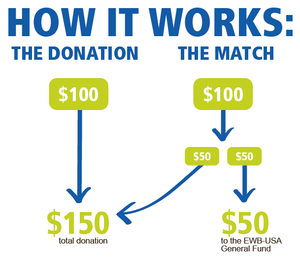 We're officially into our 2012 Year End Giving Campaign!
We're officially into our 2012 Year End Giving Campaign!
From November 26th to January 15th, EWB-USA has pledged to match any donations made by you! Half the funds will go to EWB-USA and half to our very own student chapter. That means we get 150% the donation amount, whether it's $10 or $100, and your donation will have twice the impact.
EWB-USA is also setting a prize for the groups with (1) the largest amounts of donations, and (2) the largest number of donors! We've set a goal of $30,000 this year for our projects, so if you'd like to donate, you can check out our website, where you can easily donate by card, check, or stock! Here's our donation form.
The money raised by this campaign will be put toward our chapter's project in Zambia, where we're working on three different projects -- a cell signal antenna, water filtration system, and electricity generator. We've already created prototypes for these projects, and are hoping to make another trip to Zambia this summer to implement our antenna and assess the situation in Naluja for our water filtration and electricity generation projects.
You can help us make a difference!
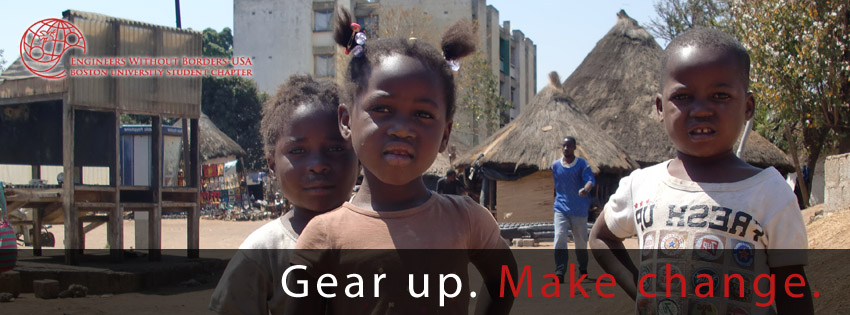
By ewbexec
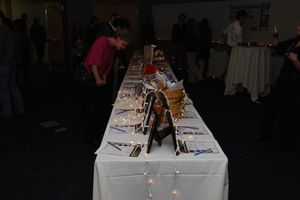 We successfully held our 8th Annual Silent Auction "Nimwela" on Friday, November 9th! We raised over $1800 for our partnership with with the Naluja Community in Zambia! It was a great way for us to let everyone know what we've been up to these last couple of months and about our trip over the summer and we had a great time with many of the students, staff, alumni, and faculty members attending.
We successfully held our 8th Annual Silent Auction "Nimwela" on Friday, November 9th! We raised over $1800 for our partnership with with the Naluja Community in Zambia! It was a great way for us to let everyone know what we've been up to these last couple of months and about our trip over the summer and we had a great time with many of the students, staff, alumni, and faculty members attending.
We had many exciting items up for auction, including:
- "Cookie of the Month" by Professor Stormy Attaway
- Tickets to Disney on Ice at TD Garden
- After Work Pool Party from Jillian's/Lucky Strike Boston
- Weekend Stay at the Liberty Hotel in Boston
- Authentic Zambian Items, including tea sets, baskets, and jewelry
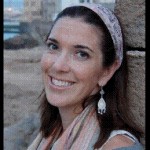 ... and much more! We also had an exciting keynote speaker in Julie Herlihy, who is currently working as an Assistant Professor in International Health and Pediatrics at Boston University's Center for Global Health & Development (CGHD). Julie is a board-certified physician and has worked in Boston, Liberia, and Zambia. Dr. Herlihy has also worked as a volunteer school teacher in Zimbabwe. She is an absolute inspiration and we thank her for taking the time out of her busy schedule to speak at our Silent Auction! For more information, check out her profile. Julie talked about her experiences working in Africa, as well as Project Mwana (which our antenna project is based off of), and the need for and potential from more integration and collaboration between doctors and engineers in order to increase health care standards.
... and much more! We also had an exciting keynote speaker in Julie Herlihy, who is currently working as an Assistant Professor in International Health and Pediatrics at Boston University's Center for Global Health & Development (CGHD). Julie is a board-certified physician and has worked in Boston, Liberia, and Zambia. Dr. Herlihy has also worked as a volunteer school teacher in Zimbabwe. She is an absolute inspiration and we thank her for taking the time out of her busy schedule to speak at our Silent Auction! For more information, check out her profile. Julie talked about her experiences working in Africa, as well as Project Mwana (which our antenna project is based off of), and the need for and potential from more integration and collaboration between doctors and engineers in order to increase health care standards.
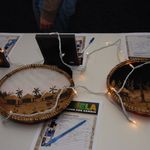 The evening was a lot of fun. In addition to great auction items and an inspirational figure in Julie, we were able to hear our Zambia travel team speak. They spoke of the conditions they found in the Naluja Community during the summer, the work they've been able to do so far, and what we hope to accomplish in the next year and beyond.
The evening was a lot of fun. In addition to great auction items and an inspirational figure in Julie, we were able to hear our Zambia travel team speak. They spoke of the conditions they found in the Naluja Community during the summer, the work they've been able to do so far, and what we hope to accomplish in the next year and beyond.
We heard not only about Project Mwana, which our project is based on, but also about the water quality conditions and how the Naluja Clinic runs. The travel team had some fun stories for us about how everyone received a Zambian name, a Nalujan kid was able to win a slingshot off one of our travelers, and how there were even a couple of marriage proposals! It was a great way to reconnect our Silent Auction with what we're trying to achieve in Naluja. For more information about our project, check out our website or EWB-USA profile.
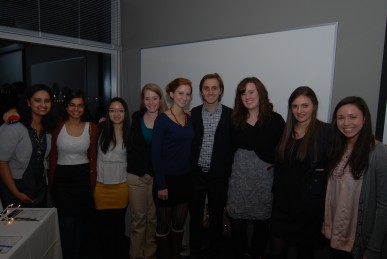 Thank-You! This could not have happened without your support.
Thank-You! This could not have happened without your support.
We would like to thank our awesome Fundraising team, and our Fundraising Chair James Parsons and Silent Auction guru Saana McDaniel of the BU Mechanical Engineering Department in particular. Everyone put forth a lot of time and effort as well, and were integral to making this event successful!
Lastly, but certainly not least, we would like to thank all who attended, in addition to our supporters and donors. We could not have done it without you! Check out the full list here.
Check out more photos of our Silent Auction on our facebook page!
 Global development efforts can be approached in a multitude of ways, as they impact every aspect of a community’s social life. It may come in the form of education, foreign monetary aid, poverty reduction efforts, implementation of projects, infrastructure, or ensuring human equality. Currently, the efforts for global change and improvement have had an astounding impact in bringing help to millions of people in impoverished communities. Spearheaded by the UN’s eight Millennium announcement, announced in 2000, are goals that researchers and other humanitarian workers will strive to achieve by 2020. These marked one of the first comprehensive and holistic programs for becoming aware and acting upon the issues around the world.
Global development efforts can be approached in a multitude of ways, as they impact every aspect of a community’s social life. It may come in the form of education, foreign monetary aid, poverty reduction efforts, implementation of projects, infrastructure, or ensuring human equality. Currently, the efforts for global change and improvement have had an astounding impact in bringing help to millions of people in impoverished communities. Spearheaded by the UN’s eight Millennium announcement, announced in 2000, are goals that researchers and other humanitarian workers will strive to achieve by 2020. These marked one of the first comprehensive and holistic programs for becoming aware and acting upon the issues around the world.










 We're officially into our 2012 Year End Giving Campaign!
We're officially into our 2012 Year End Giving Campaign!
 We successfully held our 8th Annual Silent Auction "Nimwela" on Friday, November 9th! We raised over $1800 for our partnership with with the Naluja Community in Zambia! It was a great way for us to let everyone know what we've been up to these last couple of months and about our trip over the summer and we had a great time with many of the students, staff, alumni, and faculty members attending.
We successfully held our 8th Annual Silent Auction "Nimwela" on Friday, November 9th! We raised over $1800 for our partnership with with the Naluja Community in Zambia! It was a great way for us to let everyone know what we've been up to these last couple of months and about our trip over the summer and we had a great time with many of the students, staff, alumni, and faculty members attending. ... and much more! We also had an exciting keynote speaker in Julie Herlihy, who is currently working as an Assistant Professor in International Health and Pediatrics at Boston University's Center for Global Health & Development (CGHD). Julie is a board-certified physician and has worked in Boston, Liberia, and Zambia. Dr. Herlihy has also worked as a volunteer school teacher in Zimbabwe. She is an absolute inspiration and we thank her for taking the time out of her busy schedule to speak at our Silent Auction! For more information, check out her
... and much more! We also had an exciting keynote speaker in Julie Herlihy, who is currently working as an Assistant Professor in International Health and Pediatrics at Boston University's Center for Global Health & Development (CGHD). Julie is a board-certified physician and has worked in Boston, Liberia, and Zambia. Dr. Herlihy has also worked as a volunteer school teacher in Zimbabwe. She is an absolute inspiration and we thank her for taking the time out of her busy schedule to speak at our Silent Auction! For more information, check out her 
